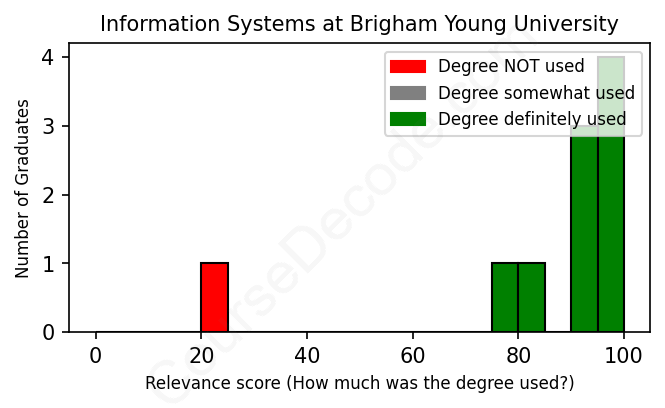
First, some facts. Of the Information Systems graduates from Brigham Young University we've analyzed , here's how many have used (or NOT used) their degree in their career:

These are estimates based on AI analysis of 10 LinkedIn profiles (see below).
The verdict? Significantly above average. Overall, with an average relevance score of 84%, Information Systems graduates from Brigham Young University have a much higher likelihood (+17%) of finding work in this field compared to the average graduate across all fields:
And for comparison, here's the chart for all profiles we've looked at across all degrees.
Also, after graduating, 40% of these graduates have pursued further education other than another Bachelor's degree (such as a Masters degree or other), compared to the average across all profiles of 35%. This suggests you may need more than just a Bachelors degree to be competitive as a Information Systems graduate.
See the details:
|
Relevance score: 93% We think this person has gone into a career highly relevant to their degree. We think this person has gone into a career highly relevant to their degree.
DEGREE INFOGraduated in 2011 from Brigham Young University with a Bachelor of Science in Information Systems. Also pursued further education since (see below). JOB HISTORY SINCE GRADUATIONIntern The Daily Herald Jan 2011 - Apr 2011 Software Engineer Intern  Doba May 2011 - Sep 2011 Instructional Support Technician  Jordan School District Sep 2011 - Jun 2012 Programmer/Analyst  Nebo School District Jul 2012 - Dec 2015 Online Instructor for BYU-I  Brigham Young University - Idaho Sep 2021 - Dec 2021 Online Instructor for BYU-I Online  Brigham Young University - Idaho Apr 2022 - Jul 2022 Systems Administrator  Brigham Young University Dec 2015 - Apr 2022 Computer Systems Administrator Level 3  Brigham Young University Apr 2022 - Present FURTHER DEGREES DONE SINCE GRADUATINGMaster of Public Administration - MPABrigham Young University 2022 - 2025 ABOUTI love to be challenged! The opportunity to take what I know and use that knowledge to solve new problems, is very exciting to me. Technology and business has given me those types of opportunities. I enjoy working with others, as well as chances to work on my own in completing tasks. |
The top 10 most common jobs done by the graduates we've analyzed (ranked most common to least) are:
Looking at the job paths of graduates from the Information Systems program at Brigham Young University, it's clear that many have found positions that closely align with their degree. A significant number have taken on roles like IT Engineer, Software Developer, or Systems Administrator, which directly utilize the technical skills and knowledge gained from their studies. These positions involve tasks like programming, systems management, and IT security, which are all essential components of information systems. Consulting roles and project management also show up frequently, with many graduates using their skills to oversee projects that require an understanding of both technology and business processes, although some of these roles may not engage with the technical aspects on a daily basis.
However, there are also many examples where the jobs taken aren't as closely tied to the core subjects of Information Systems. For instance, roles in business leadership or marketing might leverage some related skills, but the connection to their degree isn't nearly as strong. Overall, while many graduates have successfully transitioned into relevant fields, there’s a mixed bag of how closely their roles relate to the specific technical skills taught in their degree program. It’s a promising sign that graduates are generally finding work in areas where their education is valuable, but it also highlights that not every job post-degree taps into the full breadth of their Information Systems knowledge.
Here is a visual representation of the most common words in job titles for Information Systems graduates (this is across all Information Systems graduates we've analyzed, not just those who went to Brigham Young University):

Graduates from Brigham Young University who studied Information Systems seem to have taken some solid steps in their career paths after finishing school. Generally, many of them started off in roles like internships at well-known companies such as PwC and Fidelity Investments, software engineering positions, or various IT-related jobs. Just a couple of years out of college, they often level up to roles like project managers, business analysts, and even IT engineers, which is promising for anyone looking at this major. The variety of positions shows that these graduates are able to find opportunities that utilize their technical skills and business acumen right off the bat.
Fast forward five or ten years later, and the picture looks pretty good. Many of them have moved into senior roles, whether as managers, co-founders of successful startups, or even high-ranking executives in established companies. It seems like the degree opens up a mix of pathways in tech and management, where graduates can really carve out niches for themselves in fields like project management, software development, and IT consulting. Overall, the trends indicate that graduates from this program tend to find careers that are not only relevant to Information Systems but also lead to advancement and leadership opportunities in their fields. So, for someone considering this degree, it looks like a wise choice for a future-proof career!
Getting a Bachelor’s degree in Information Systems at Brigham Young University can be pretty demanding, but it’s not the hardest degree out there. You’ll be diving into topics like databases, programming, and systems design, so if you enjoy tech stuff and problem-solving, you might find it engaging rather than overwhelming. That said, the coursework can get challenging, especially if math and analytical thinking aren’t your strong suits, but with some dedication and a bit of help from professors or classmates, you can definitely manage it. Overall, it strikes a balance—there are tough moments, but it’s not unbearably difficult for most students who put in the effort.
Most commonly, in the LinkedIn profiles we've looked at, it takes people 4 years to finish a Bachelor degree in Information Systems.
Looking at these BYU grads, it seems like they've done pretty well for themselves financially! Many of them have landed solid jobs in reputable firms like PwC and Microsoft, which usually pay well, especially for managers and senior roles. Plus, there are a couple of entrepreneurs in the mix who started their own companies, which can be a great path to making good money if they succeed. While the earlier roles like internships and entry-level positions aren’t the biggest paychecks, it seems like most of them quickly climbed the ladder to better-paying positions. So, yeah, overall, it looks like they're earning decent salaries now, especially as they gain more experience in their fields!
Here is a visual representation of the most common words seen in the "about" section of LinkedIn profiles who have a Bachelor degree in Information Systems (this is across all Information Systems graduates we've analyzed, not just those who went to Brigham Young University). This may or may not be useful:

Here are all colleges offering a Bachelor degree in Information Systems (ordered by the average relevance score of their Information Systems graduates, best to worst) where we have analyzed at least 10 of their graduates:
| College | Score | Count |
|---|---|---|
 Brigham Young University Brigham Young University
|
84 | 10 |
 University of Maryland Baltimore County University of Maryland Baltimore County
|
83 | 17 |